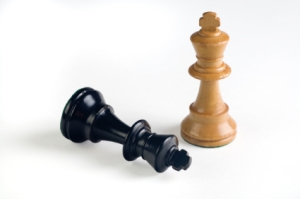I am not a great chess player, but I like the game. People like to play chess with me because I usually lose. Once, in the middle of a game, my friend, who is a scientist, called out in despair: “what kind of game are you playing? All your pieces are hanging in the air.” I smiled and asked him if this is not what games were for. Aren’t they the place for us to take the risks we do not dare take in real life? Maybe we can even learn something from the game about real life risk taking. Lately I have been following the Chess World Championship. When watching a chess tournament or professionals play, there is a feeling of very little space. At least twenty to twenty five first moves are predictable the moment the second move has been played. Nowadays, children memorize all the openings and the variations of the openings and the variations of the variations. Trying to improve my playing I have books about openings, endgames, mid-games and what not. Even if I understand and memorize, it is just as with cooking: I just cannot follow the recipe as is.
I am not really a person of competitions either. However, I do play the game and my students take part in competitions and auditions. I encourage them to take part in competitions and in additions as long as it does not interfere too much with the learning process. No reality show overnight megastars.

Sometimes I sit on juries of competitions or on search committees. There too, I see the very experienced professionals. Those professionals know the competition business inside out. They usually will have it all figured out. One can tell that even the shy head movement while they bow, has been planned in advance. Sometimes I get the feeling that if they played it all over again, it would sound exactly the same. I am usually interested in those who surprise me: those who might not be as polished as the other ones, those who will probably not win the competition or get the position. Those people that make me feel like I would like to work with them, I would like to be their partner on a project, without knowing exactly what kind of project. In the worst case we might just become friends.
Somebody once said that beginning chess players see pieces, planning which pieces they should take. More experienced players see squares: which squares should they control and which squares will allow them to take an interesting path.
__________________________________________________________________
If you would like to read more about those subjects I welcome you to visit my website at
www.DriveADoubleBass.com
You can also contact me at klinghoffer@jamd.ac.il
Also, if you have any ideas for things that you would like me to discuss in future posts, please write to me.

 DriveADoubleBass
DriveADoubleBass The Conservatory Orchestra at JAMD
The Conservatory Orchestra at JAMD The Rolling Orchestra
The Rolling Orchestra
Interesting comments, Michael. As a pianist, I competed because I loved the game. As a music teacher now, competition led me to study both the piano and the organ and voice to become more marketable. Now, I enjoy the music! Oh, my website is painting and I’m on facebook if you would like to follow my art work. I find that it works well with my teaching music.
This makes me want to add that sometimes for me a game is just a game for the sake of it when i don’t need to “see” figures or/either squares. I just play and the process is overwhelming, consuming my whole being and creating a purpose (rather to play more than to win and stop; well on the second thought that would bring a new game after? 🙂